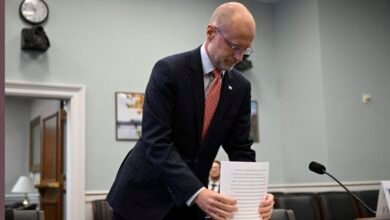FBI Alert: Deepfake Audio Scams Impersonate Officials

▼ Summary
– The FBI warns of a malicious campaign using AI-generated voice deepfakes to impersonate government officials and trick targets into clicking harmful links.
– Since April 2025, attackers have targeted current/former senior US officials and their contacts via fake messages, urging recipients to verify authenticity.
– The campaign combines AI voice messages and texts to build trust before stealing personal data, with deepfakes often indistinguishable from real voices.
– Attackers may lure victims to switch messaging platforms and click malicious links, though the FBI advisory lacks further campaign specifics.
– Deepfake fraud is rising, with past incidents including phishing against LastPass and fake Biden robocalls, leading to indictments and penalties.
The FBI has issued an urgent warning about sophisticated scams using AI-generated voice impersonations of high-ranking officials to manipulate victims into compromising their devices. These deepfake audio attacks, which began surfacing in April 2025, specifically target current and former government employees, as well as their associates. The bureau emphasizes that no one should automatically trust unexpected messages claiming to originate from senior officials—even if the voice sounds convincingly real.
Cybercriminals are deploying these fabricated voice messages alongside texts to build false trust before exploiting victims. Deepfake technology has advanced to the point where AI can replicate speech patterns, tone, and even subtle vocal quirks with alarming accuracy. Without specialized tools, distinguishing between a genuine recording and a synthetic one is nearly impossible.
One common tactic involves attackers persuading targets to switch conversations to another messaging platform under false pretenses. Once trust is established, victims are tricked into clicking malicious links disguised as necessary for continuing the conversation. The FBI’s alert didn’t disclose further specifics about the ongoing operation but stressed the importance of skepticism toward unsolicited communications.
This advisory follows a surge in deepfake-related fraud and espionage cases. Last year, LastPass disclosed a phishing scheme where hackers combined emails, texts, and voice calls—including a fake CEO audio deepfake—to steal master passwords. In another high-profile case, spoofed robocalls featuring a fabricated Joe Biden voice urged New Hampshire voters to skip the election, leading to criminal charges against a political operative. The telecom carrier involved faced a $1 million penalty for failing to verify caller identities as mandated by FCC regulations.
As AI tools become more accessible, experts warn that such deceptive tactics will only grow more prevalent. Vigilance and verification remain the best defenses against these increasingly convincing digital impersonations.
(Source: Ars Technica)





